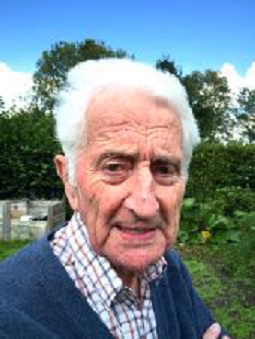Professor Michael Parker Banton 1926-2018

(Photo: Rohit Barot 1 September 2017)
One of the most distinguished postwar scholars Professor Michael Parker Banton died on 21 May 2018 at the age of 92. Michael’s academic journey began at the London School of Economics after he had served in the Royal Navy as a Sub-Lieutenant, RNVR at the end of Second World War. Edward Shils and Karl Popper had inspired him to pursue an academic career for the advancement of knowledge. After he had graduated from the LSE, Banton secured a research assistantship in the Department of Social Anthropology at the University of Edinburgh where he was later appointed to a new lectureship in social anthropology. Under Kenneth Little’s headship and with Nuffield Foundation grants, Michael published three books The Coloured Quarter (1955). West African City (1957) and White and Coloured (1959) based on his research on the settlement of colonial immigrants in London. The Policemen in the Community (1964) reported his research into police community relations Scotland and three cities in the USA. With his increasing participation in the Association of Social Anthropologists and a Readership in Anthropology at Edinburgh, Michael came to Bristol to establish the Department of Sociology with his appointment as the first Professor of Sociology in 1965. He published his comparative study Race Relations in 1967.
In addition to heading the Department of Sociology over a quarter of a century until he retired in 1992, Michael headed the Social Science Research Council’s Research Unit on Ethnic Relations from 1971 to 1978. The Unit was concerned with Michael’s interest in theories and specific issues as they were likely to influence the settlement of of migrants from the Caribbean as well as from freshly decolonised African countries. Decolonisation and expulsion of the Ugandan Asians had stimulated East African Indian migration to Britain. It was in this dynamic context that Banton began to build a social science institution that would provide a better understanding of problems migrants and refugees faced in settling down in British cities and towns. The appointment of Robin Ward, Robert Miles, Annie Phizacklea, Roger Ballard, Avatar Kaur Brah, Peter Weinreich and Sandra Wallman brought together scholars with diverse research interests and perspectives. Michael remained active in policy fields. He served as a Justice of the Peace (1966-92). He was a members of the Royal Commission on Civil Disorders in Bermuda in 1978 and played an active part as a member of the Royal Commission on Criminal Procedure in 1978-81. He was as a member of the United Nations Committee on the Elimination of Racial discrimination, Chairman from 1996-98 and Rapporteur from 1990-96 and from 1998-2001. This experience stimulated the publication of International Action Against Racial Discrimination in 1996 and the International Politics of Race in 2002.
It is well-known that sociological arguments about race, racism and ethnicity have gone through complex trajectories in recent decades. Banton had found the significance of physical and cultural differences in human interaction as a basis for examining discrimination and exclusion as well as the redress that anti-discriminatory measures can provide. His methodology focussed on individual micro sociological units rather than on macro sociological levels. Although he did not see macro and micro in mutual exclusion, he stated clearly that his view was grounded in Kantian epistemology with a focus on the individual and being distinct from a Hegelian perspective which would locate humans in a macro level layers of social and political realities. It is in this context the he used his rational choice paradigm to analyse micro level choices made by individuals to enforce inclusion and and exclusion. His book Racial and Ethnic Competition (1983) explores this in detail to propose competition and maximisation of advantage as a basis for interpersonal alignments. His UN affiliation to ICERD or International Convention on the Elimination of all forms of Racial Discrimination is a testimony to his view of racial discrimination as unjust source of inequality, a theme which he examined throughout the course of his professional life. Scholars and students of race, racism and ethnicity will remember him as an outstanding scholar who contributed so much to both intellectual and policy dimensions of race and ethnic studies. When Michael retired in 1992, with the support of Professor Theo Nichols, then Head of the Department of Sociology, we organised a conference titled Social Order in Post Classical Sociology. Academics who participated in this conference recognised that Michael Banton was an outstanding scholar and had contributed a whole range of ideas to stimulate theoretical discussion on race and ethnicity with his consistent support for elimination of discrimination in all modern societies. His ideas will find expression in the future history of study of the minority groups in Britain.
My last meeting with him took place on 1st September 2017 in Downe in Kent at his bungalow. Although now somewhat frail at the age of 91, he was as intellectually engaged as ever and insisted on driving me back to the station. Michael Banton was born on 8th September 1926 and and and died peacefully on 21st May 2018 in his home town Downe in Kent. His wife Marianne and his son Nicholas had passed away during his life time and his three children Dagmar, Ragnhild and Christopher survive him.
ROHIT BAROT
University of Bristol
To cite this article:
BAROT, ROHIT. 2018 ‘Professor Michael Parker Banton 1926-2018’. Obituaries. Royal Anthropological Institute, June 2018. (available on-line: https://therai.org.uk/archives-and-manuscripts/obituaries/professor-michael-parker-banton)
Related:
BENTHALL, JONATHAN. 2018 ‘Michael Banton’. Obituaries. Royal Anthropological Institute, June 2018. (available on-line: https://therai.org.uk/archives-and-manuscripts/obituaries/michael-banton-2)
GRILLO, RALPH. 2018 ‘Michael Banton, 1926-2018’. Obituaries. Royal Anthropological Institute, May 2018. (available on-line: https://therai.org.uk/archives-and-manuscripts/obituaries/michael-banton)
WALLMAN, SANDRA. 2018 ‘Prof Michael Banton: A Short Thought’. Obituaries. Royal Anthropological Institute, June 2018. (available on-line: https://therai.org.uk/archives-and-manuscripts/obituaries/prof-michael-banton)
